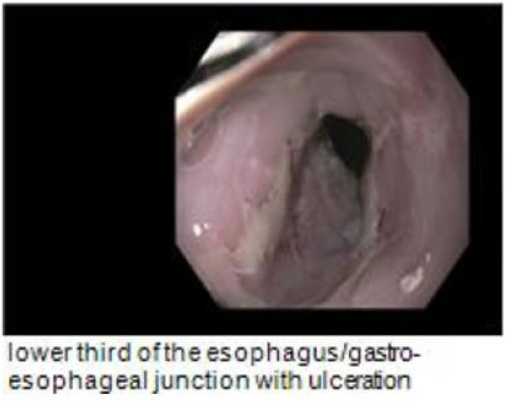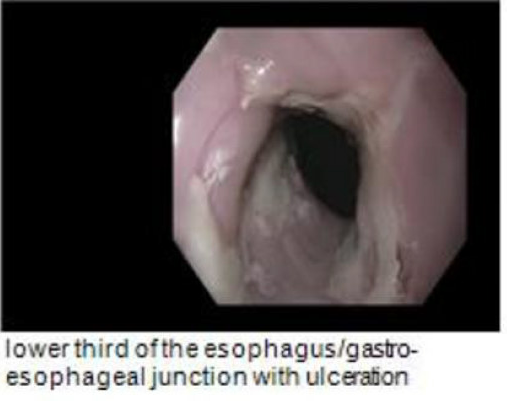Tuesday Poster Session
Category: Esophagus
P5031 - HSV Esophagitis Presenting With Upper GI Bleeding in an Immunocompetent Patient: A Case Report
Tuesday, October 28, 2025
10:30 AM - 4:00 PM PDT
Location: Exhibit Hall
- JH
Joann Ha, DO
Jefferson Health
Voorhees, NJ
Presenting Author(s)
Joann Ha, DO1, Marisa Pope, DO2, Seth Lipshutz, DO2, Mansi Sheth, DO3, Tony Elias, DO4, Richard Walters, DO5
1Jefferson Health, Voorhees, NJ; 2Jefferson Health, Cherry Hill, NJ; 3Jefferson Torresdale Hospital, Bridgewater, NJ; 4Temple University, Stratford, NJ; 5Jefferson Health, Sewell, NJ
Introduction: Herpes simplex virus (HSV) esophagitis is a viral inflammation of the esophagus, predominantly caused by HSV-1. It is commonly associated with immunocompromised states, including HIV/AIDS, malignancies, or immunosuppressive therapy. However, it has also been reported in immunocompetent or elderly individuals. Typical symptoms include odynophagia, dysphagia, and retrosternal pain, though elderly or cognitively impaired patients may present atypically. We present a case of microcytic anemia caused by HSV esophagitis.
Diagnosis relies on biopsy with histopathologic features such as multinucleated giant cells and Cowdry type A inclusions, as well as PCR or immunohistochemical confirmation. GI bleeding is a recognized but uncommon complication. In such cases, normocytic anemia may reflect either acute blood loss or anemia of chronic disease—especially in elderly patients with comorbidities like heart failure or chronic inflammation. This highlights the importance of considering HSV esophagitis in elderly patients presenting with unexplained anemia or melena, even in the absence of overt immunosuppression.
Case Description/
Methods: An 82-year-old female with a history of atrial fibrillation on anticoagulation, heart failure with reduced ejection fraction, and prior peptic ulcer disease presented after a fall. She endorsed melena for two weeks prior. Initial lab work revealed normocytic anemia with hemoglobin 4.3 g/dL. She received two units of packed red blood cells and was started on proton pump inhibitor therapy.
Given her prior GI history, she underwent esophagogastroduodenoscopy, which showed ulcerative esophagitis. Biopsy revealed acute inflammation and cellular changes consistent with HSV infection, positive for HSV-1/2. The patient was treated with acyclovir 500 mg for 14 days, resulting in clinical improvement.
Discussion: This case shows the importance of maintaining a broad differential diagnosis in elderly patients with upper GI bleeding, especially those on anticoagulation. Although peptic ulcer disease was initially suspected, biopsy confirmed HSV esophagitis as the bleeding source despite the patient being immunocompetent. It has only been reported that 5.3% with HSV esophagitis are immunocompetent and will present with Upper GI bleeding. Early endoscopy and histologic confirmation enabled appropriate treatment. HSV esophagitis should be considered in high-risk patients, even without clear immunosuppression to prevent complications such as bleeding, stricture, or perforation.

Figure: EGD Findings

Figure: EGD Findings
Disclosures:
Joann Ha indicated no relevant financial relationships.
Marisa Pope indicated no relevant financial relationships.
Seth Lipshutz indicated no relevant financial relationships.
Mansi Sheth indicated no relevant financial relationships.
Tony Elias indicated no relevant financial relationships.
Richard Walters indicated no relevant financial relationships.
Joann Ha, DO1, Marisa Pope, DO2, Seth Lipshutz, DO2, Mansi Sheth, DO3, Tony Elias, DO4, Richard Walters, DO5. P5031 - HSV Esophagitis Presenting With Upper GI Bleeding in an Immunocompetent Patient: A Case Report, ACG 2025 Annual Scientific Meeting Abstracts. Phoenix, AZ: American College of Gastroenterology.
1Jefferson Health, Voorhees, NJ; 2Jefferson Health, Cherry Hill, NJ; 3Jefferson Torresdale Hospital, Bridgewater, NJ; 4Temple University, Stratford, NJ; 5Jefferson Health, Sewell, NJ
Introduction: Herpes simplex virus (HSV) esophagitis is a viral inflammation of the esophagus, predominantly caused by HSV-1. It is commonly associated with immunocompromised states, including HIV/AIDS, malignancies, or immunosuppressive therapy. However, it has also been reported in immunocompetent or elderly individuals. Typical symptoms include odynophagia, dysphagia, and retrosternal pain, though elderly or cognitively impaired patients may present atypically. We present a case of microcytic anemia caused by HSV esophagitis.
Diagnosis relies on biopsy with histopathologic features such as multinucleated giant cells and Cowdry type A inclusions, as well as PCR or immunohistochemical confirmation. GI bleeding is a recognized but uncommon complication. In such cases, normocytic anemia may reflect either acute blood loss or anemia of chronic disease—especially in elderly patients with comorbidities like heart failure or chronic inflammation. This highlights the importance of considering HSV esophagitis in elderly patients presenting with unexplained anemia or melena, even in the absence of overt immunosuppression.
Case Description/
Methods: An 82-year-old female with a history of atrial fibrillation on anticoagulation, heart failure with reduced ejection fraction, and prior peptic ulcer disease presented after a fall. She endorsed melena for two weeks prior. Initial lab work revealed normocytic anemia with hemoglobin 4.3 g/dL. She received two units of packed red blood cells and was started on proton pump inhibitor therapy.
Given her prior GI history, she underwent esophagogastroduodenoscopy, which showed ulcerative esophagitis. Biopsy revealed acute inflammation and cellular changes consistent with HSV infection, positive for HSV-1/2. The patient was treated with acyclovir 500 mg for 14 days, resulting in clinical improvement.
Discussion: This case shows the importance of maintaining a broad differential diagnosis in elderly patients with upper GI bleeding, especially those on anticoagulation. Although peptic ulcer disease was initially suspected, biopsy confirmed HSV esophagitis as the bleeding source despite the patient being immunocompetent. It has only been reported that 5.3% with HSV esophagitis are immunocompetent and will present with Upper GI bleeding. Early endoscopy and histologic confirmation enabled appropriate treatment. HSV esophagitis should be considered in high-risk patients, even without clear immunosuppression to prevent complications such as bleeding, stricture, or perforation.

Figure: EGD Findings

Figure: EGD Findings
Disclosures:
Joann Ha indicated no relevant financial relationships.
Marisa Pope indicated no relevant financial relationships.
Seth Lipshutz indicated no relevant financial relationships.
Mansi Sheth indicated no relevant financial relationships.
Tony Elias indicated no relevant financial relationships.
Richard Walters indicated no relevant financial relationships.
Joann Ha, DO1, Marisa Pope, DO2, Seth Lipshutz, DO2, Mansi Sheth, DO3, Tony Elias, DO4, Richard Walters, DO5. P5031 - HSV Esophagitis Presenting With Upper GI Bleeding in an Immunocompetent Patient: A Case Report, ACG 2025 Annual Scientific Meeting Abstracts. Phoenix, AZ: American College of Gastroenterology.
